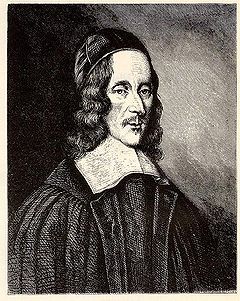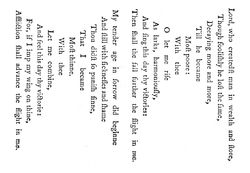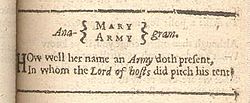- George Herbert
-
For other people named George Herbert, see George Herbert (disambiguation).
George Herbert 
Portrait by Robert White in 1674
(National Portrait Gallery)Born 3 April 1593
Montgomery, WalesDied 1 March 1633 (aged 39)
Bemerton, Wiltshire, EnglandOccupation Poet, orator, priest George Herbert (3 April 1593 – 1 March 1633) was a Welsh born English poet, orator and Anglican priest.
Being born into an artistic and wealthy family, he received a good education that led to his holding prominent positions at Cambridge University and Parliament. As a student at Trinity College, Cambridge, Herbert excelled in languages and music. He went to college with the intention of becoming a priest, but his scholarship attracted the attention of King James I/VI. Herbert served in parliament for two years. After the death of King James and at the urging of a friend, Herbert's interest in ordained ministry was renewed.
In 1630, in his late thirties he gave up his secular ambitions and took holy orders in the Church of England, spending the rest of his life as a rector of the little parish of Fugglestone St Peter with Bemerton St Andrew, near Salisbury. He was noted for unfailing care for his parishioners, bringing the sacraments to them when they were ill, and providing food and clothing for those in need. Henry Vaughan said of him"a most glorious saint and seer".[1]
Throughout his life, he wrote religious poems characterized by a precision of language, a metrical versatility, and an ingenious use of imagery or conceits that was favoured by the metaphysical school of poets.[2] Charles Cotton described him as a "soul composed of harmonies".[3] Herbert himself, in a letter to Nicholas Ferrar, said of his writings, "they are a picture of spiritual conflicts between God and my soul before I could subject my will to Jesus, my Master".[4] Some of Herbert's poems have endured as hymns, including "King of Glory, King of Peace" (Praise), "Let All the World in Every Corner Sing" (Antiphon) and "Teach me, my God and King" (The Elixir).[5]
A distant relative is the modern Polish poet Zbigniew Herbert.[6]
Contents
Early life
Herbert was born in Montgomery in Wales. His family was wealthy, eminent, intellectual and fond of the arts. His mother Magdalen was a patron and friend of John Donne and other poets;[7] his older brother Edward, later Lord Herbert of Cherbury, was an important poet and philosopher, often referred to as "the father of English deism". Herbert's father Richard Herbert, Lord of Cherbury died when George was three, leaving a widow and ten children.[8]
Herbert entered Westminster School at or around the age of 12 where he became a day student.[8] Though sometime after he was elevated to the level of scholar. Herbert later was admitted on scholarship to Trinity College, Cambridge in 1609 where he graduated first with a Bachelors and then with a masters degree in 1613 at the age of 20.[8] After graduating from Westminster School and Trinity College, Cambridge (where he achieved degrees with distinction), Herbert was elected a major fellow of his college. In 1618 he was appointed Reader in Rhetoric at Cambridge and in 1620 he was elected to the post of Cambridge University orator, whose duties would be served by poetic skill. He held this position until 1628.[9]
In 1624 he became a Member of Parliament, representing Montgomery.[10] While these positions were suited to a career at court, and James I had shown him favour, circumstances worked against him: the King died in 1625, and two influential patrons of Herbert died later in the decade. However George Herbert's only service to parliament may have already ended in 1624 or since, although a Mr Herbert is mentioned as a committee member, there is no record in the Commons Journal for 1625 of Mr. George Herbert (a distinction carefully made in the records of the preceding parliament).[8]
Priesthood
He took up his duties in Bemerton, a rural parish in Wiltshire, about 75 miles southwest of London in 1630. Here he preached and wrote poetry; also helping to rebuild the church out of his own funds.[8]
In 1633 Herbert finished a collection of poems entitled The Temple, which imitates the architectural style of churches through both the meaning of the words and their visual layout. The themes of God and love are treated by Herbert as much as psychological forces as metaphysical phenomena.
Suffering from poor health, Herbert died of tuberculosis only three years after taking holy orders. On his deathbed, he reportedly gave the manuscript of The Temple to Nicholas Ferrar, the founder of a semi-monastic Anglican religious community at Little Gidding (a name best known today through the poem Little Gidding by T. S. Eliot), telling him to publish the poems if he thought they might "turn to the advantage of any dejected poor soul", and otherwise, to burn them.
Works
 Herbert's "Easter Wings", a pattern poem in which the work is not only meant to be read, but its shape is meant to be appreciated: In this case, the poem was printed (original image here shown) on two pages of a book, sideways, so that the lines suggest two birds flying upward, with wings spread out.
Herbert's "Easter Wings", a pattern poem in which the work is not only meant to be read, but its shape is meant to be appreciated: In this case, the poem was printed (original image here shown) on two pages of a book, sideways, so that the lines suggest two birds flying upward, with wings spread out.
In 1633 (see 1633 in poetry), all of Herbert's poems were published in The Temple: Sacred poems and private ejaculations, edited by Nicholas Ferrar. The book went through eight editions by 1690.[11]
Barnabas Oley edited in 1652 Herbert's Remains, or sundry pieces of that Sweet Singer, Mr. George Herbert, containing A Priest to the Temple, or the countrey parson, Jacula Prudentum, &c. Prefixed was an unsigned preface by Oley. The second edition appeared in 1671 as A Priest to the Temple or the Country Parson, with a new preface, signed Barnabas Oley. These pieces were reprinted in later editions of Herbert's Works. The manuscript of The Country Parson was the property of Herbert's friend, Arthur Wodenoth, who gave it to Oley; the prefaces were a source for Izaak Walton's memoir of Herbert.
All of Herbert's English surviving poems are religious, and some have been used as hymns, William Cowper said of them I found in them a strain of piety which I could not but admire.[12] They are characterised by directness of expression and some conceits which can appear quaint. Many of the poems have intricate rhyme schemes, and variations of lines within stanzas described as 'a cascade of form floats through the temple'.[13]
An example of Herbert’s religious poetry is “The Altar.” A "pattern poem in which the words of the poem itself form a shape suggesting an altar, and this altar becomes his conceit for how one should offer himself as a sacrifice to the Lord. He also makes allusions to scripture, such as Psalm 51:17, where it states that the Lord requires the sacrifice of a broken heart and a contrite spirit.
Herbert also wrote A Priest to the Temple (or The Country Parson) offering practical advice to clergy. In it, he advises that "things of ordinary use" such as ploughs, leaven, or dances, could be made to "serve for lights even of Heavenly Truths".
His Jacula Prudentium (sometimes seen as Jacula Prudentum), a collection of pithy proverbs published in 1651, included many sayings still repeated today, for example "His bark is worse than his bite." Similarly oft quoted is his Outlandish Proverbs[14] published in 1640.
Richard Baxter said, "Herbert speaks to God like one that really believeth a God, and whose business in the world is most with God. Heart-work and heaven-work make up his books". Dame Helen Gardner adds "head-work" because of his "intellectual vivacity".
Herbert also wrote poems in Greek and in Latin. The latter mainly concern ceremonial controversy with the Puritans, but include a response to Pope Urban VIII's treatment of the ROMA AMOR anagram. He was also a collector of "Outlandish proverbs", some of which are used in his poem The Sacrifice.[15] and he wrote in many poetic forms, appropriate to their theme,and invented, as it were, to embody them [16]
Herbert influenced his fellow metaphysical poet Henry Vaughan who, in turn, influenced William Wordsworth.
Herbert's poetry has been set to music by several composers, including Ralph Vaughan Williams, Lennox Berkeley, Benjamin Britten, Judith Weir, Randall Thompson, William Walton and Patrick Larley.
Commemorations
He is commemorated on 27 February throughout the Anglican Communion and on 1 March of the Calendar of Saints of the Evangelical Lutheran Church in America.
Herbert has a window honouring him in Westminster Abbey.[17] and a statue in niche 188 on the West Front of Salisbury Cathedral.
Further reading
- G. Herbert, The Works of George Herbert, ed. F. E. Hutchinson, 1945.
- G. Herbert, The English Poems of George Herbert, ed. Helen Wilcox (Cambridge University Press, 2007)
- Elizabeth Clarke, Theory and Theology in George Herbert's Poetry: Divinitie, and Poesie, Met, Clarendon Press, 1997. ISBN 978-0198263982
- Jane Falloon, Heart in Pilgrimage: A Study of George Herbert, AuthorHouse, Milton Keynes, 2007. ISBN 978-1-4259-7755-9
- Justin Lewis-Anthony, If You Meet George Herbert on the road, Kill Him: Radically re-thinking priestly ministry, an exploration of the life of George Herbert as a take-off for a re-evaluation of the ministry within the Church of England. Mowbray, August 2009. ISBN 978-1906286170
- Ceri Sullivan, The Rhetoric of the Conscience in Donne, Herbert, and Vaughan (Oxford University Press, 2008)
- Jim Scott Orrick, A Year with George Herbert: A Guide to Fifty-Two of His Best Loved Poems (Eugene, OR: Wipf & Stock, 2011).
See also
References
- ^ Henry Vaughan, Mount of Olives, 1652
- ^ The Grolier 1996 Multimedia Encyclopedia, Grolier Electronic Publishing, Inc.
- ^ Schmidt Michael, Poets on Poets, (Essay on George Herbert), Carcanet Press, Manchester, 1997 ISBN 1-85754-339-4
- ^ Maycock A L, Nicholas Ferrar of Little Gidding,SPCK,London 1938
- ^ The Baptist Hymn Book,Poems and Hymn Trust,London 1962
- ^ "The New York Times". 29 July 1998. The New York Times. http://query.nytimes.com/gst/fullpage.html?res=950CE3DF1438F93AA15754C0A96E958260. Retrieved 2010-11-19.
- ^ Donne would later become godfather to the young Herbert after the death of Herbert's biological father. schoolforteachers.org
- ^ a b c d e Charles, Amy M. (1977). A Life of George Herbert. Cornell University Press. p. 28.
- ^ Herbert, George in Venn, J. & J. A., Alumni Cantabrigienses, Cambridge University Press, 10 vols, 1922–1958.
- ^ W. R. Williams, Parliamentary History of the Principality of Wales, p. 149
- ^ Cox, Michael, editor, The Concise Oxford Chronology of English Literature, p 92, Oxford University Press, 2004, ISBN 0-19-860634-6
- ^ William Cowper,Memoirs of the Early Life of William Cowper,written by Himself, 1816
- ^ Vendler H, The Poetry of George Herbert, Harvard Universiry Press, 1975 ISBN 978-0-674-67959-7
- ^ books.google.es
- ^ Hutchinson F E (ed),The Works of George Herbert, Oxford 1940 ISBN
- ^ Schmidt Michael, Essay -George Herbert, Poets on Poets, Carcarnet Press, Manchester, 1997 ISBN 1-85754-339-4.
- ^ Dunton, Larkin (1896). The World and Its People. Silver, Burdett. p. 35.
Sheldrake, Philip (2009) Heaven in Ordinary: George Herbert and his writings. Canterbury Press ISBN 978-1-85311-948-4
External links
- George Herbert at the Cambridge Authors Project
- George Herbert Bio and Poems
- The Works of George Herbert
- George Herbert and Bemerton about his priesthood and parish
- Selected Poetry of George Herbert at Representative Poetry Online
- The Life of Mr. George Herbert by Izaak Walton (1593–1683)
- Easterwings (poem by George Herbert) with commentary upon and pics of its modern and 1633 arrangements
- George Herbert poem My Elixir as hymn 'Teach me, My God and King', ccel.org
- The remains of that sweet singer of The temple, by George Herbert, George Herbert, Izaak, Walton, Barnabas Oley
- Musarum Deliciae: or, the muses recreation, contening severall pieces of ...
Categories:- 1593 births
- 1633 deaths
- Herbert family
- Alumni of Trinity College, Cambridge
- Cambridge University Orators
- Welsh Anglican priests
- English Anglican priests
- 17th-century Anglican priests
- Anglo-Welsh poets
- Christian writers
- Welsh poets
- English poets
- People celebrated in the Lutheran liturgical calendar
- Old Westminsters
- Sonneteers
- Anglican saints
- Christian mystics
- Greek-language poets
Wikimedia Foundation. 2010.

